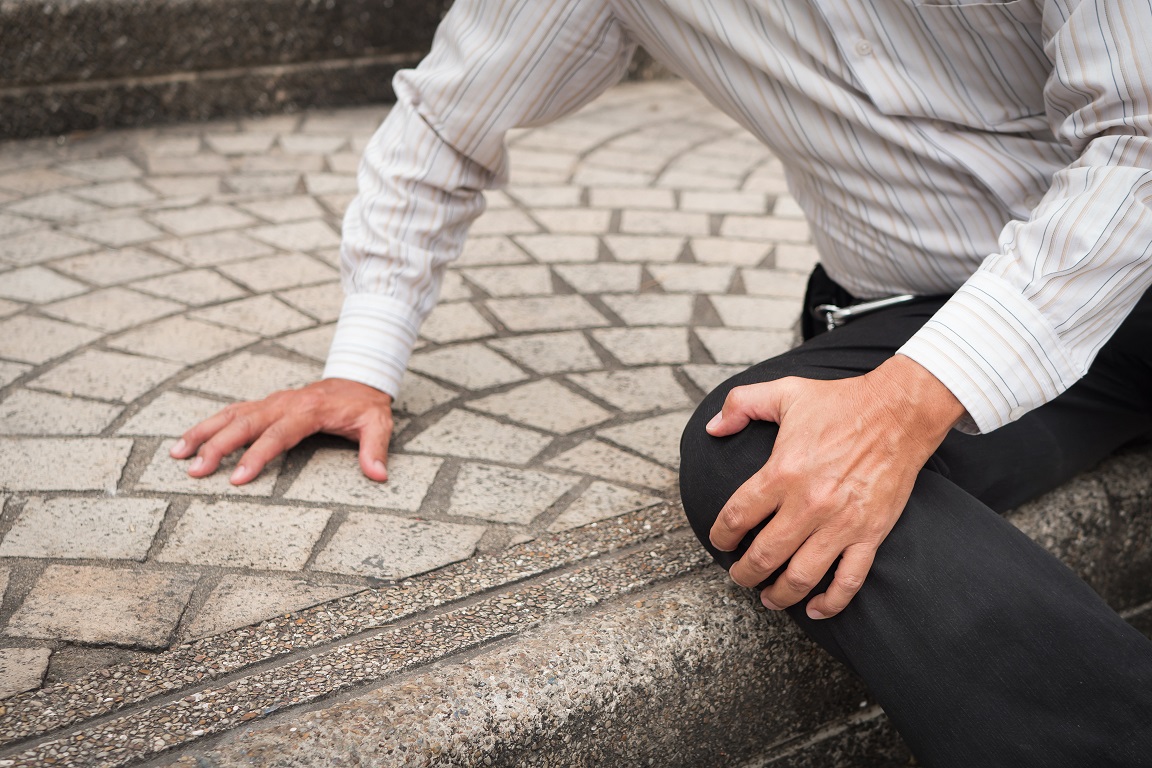Many people will suffer a minor injury from a trip or a fall at some point in their lifetime, whether this is due to clumsiness, misjudgement, or the negligence of someone else. But when should you think about making a claim for your accident?
Much of the time, injuries will heal quickly and there may not be any need for medical attention. However, in some cases, people are unfortunate enough to suffer more serious injuries, requiring ongoing medical attention and time away from work for long periods of time.
When a trip or fall is not your fault, you may wish to explore making a claim for compensation.
The types of circumstances where a claim could be made, might include:
- Tripping or falling on uneven or damaged pavements or loose paving slabs
- Accidents on broken or defective steps, ramps, stairs, or handrails
- Slips on wet surfaces without sufficient warning or attention
- Falls due to poor lighting in streets or public places
- Falls in the workplace from tripping hazards or unsafe working environments
Trips, Slips and Falls Claims
These types of claims can vary in severity and injuries can range from sprains, cuts and bruises to fractures, head injuries, slipped discs or ligament damage.
An accident could take place in a number of different places, for example, supermarkets, shopping centres, gyms, schools, offices, workplaces, high streets, leisure centres. In public places, the responsibility lies with the owner to make sure places are safe and maintained regularly.
If you have suffered an injury which has resulted in you needing hospital treatment, surgery, or physiotherapy then your life has probably been ‘put on hold’ whilst you recover from your accident. If you have needed to take time off work or have been unable to work at all after your accident, then you might have suffered loss of earnings too. Most workplaces will only offer paid sick leave for a limited amount of time and extended time off work on statutory sick pay can really impact your family’s financial stability.
To win a claim, you must be able to prove that the slip, trip or fall was caused solely by the negligence of someone else or negligence of the organisation responsible. For example, if a loose drain cover had been reported to the local council responsible and there was no attempt to repair it and an accident then occurred causing injury, you might be able to pursue a claim.
Evidence plays a big part in supporting your claim for a slip, trip or fall. Photographs from the scene of the accident are particularly important. You might not think about taking pictures at the time, particularly if you are badly injured, but it is worth re-visiting or asking a family member or friend to return to take photos. Taking measurements of defects is also important.
Claims must be brought within 3 years of the accident, so it is important to start the claims process sooner rather than later to ensure you have enough time.
No Win No Fee Claim
At Lamb Brooks we handle all claims on a ‘no win, no fee’ arrangement, which means there is no risk to you when pursuing a claim for compensation. All initial expenses, such as solicitor’s time, medical reports, expert opinions and administration fees, are covered by us.
To find out if you have a claim and what the next steps are, please call our specialist Personal Injury Team on 01256 844888. Alternatively, you can email enquiries@lambbrooks.com or speak to our online chat assistant, who can take your information and put you in touch with the best person to deal with your case.
We pride ourselves on being realistic and pro-active litigators, who will fight to get you the highest reward possible for your pain and suffering. If you wish to discuss your situation and see if you have a claim for compensation, then please get in touch today.
Other articles you may be interested in reading:
Gathering Evidence for an Injury Claim
Is the Clock Ticking on Your Injury Claim?
Injured At Work: Is Your Employer Responsible or Not?
The contents of this article are for the purposes of general awareness only. They do not purport to constitute legal or professional advice. The law may have changed since this article was published. Readers should not act on the basis of the information included and should take appropriate professional advice upon their own particular circumstances.

